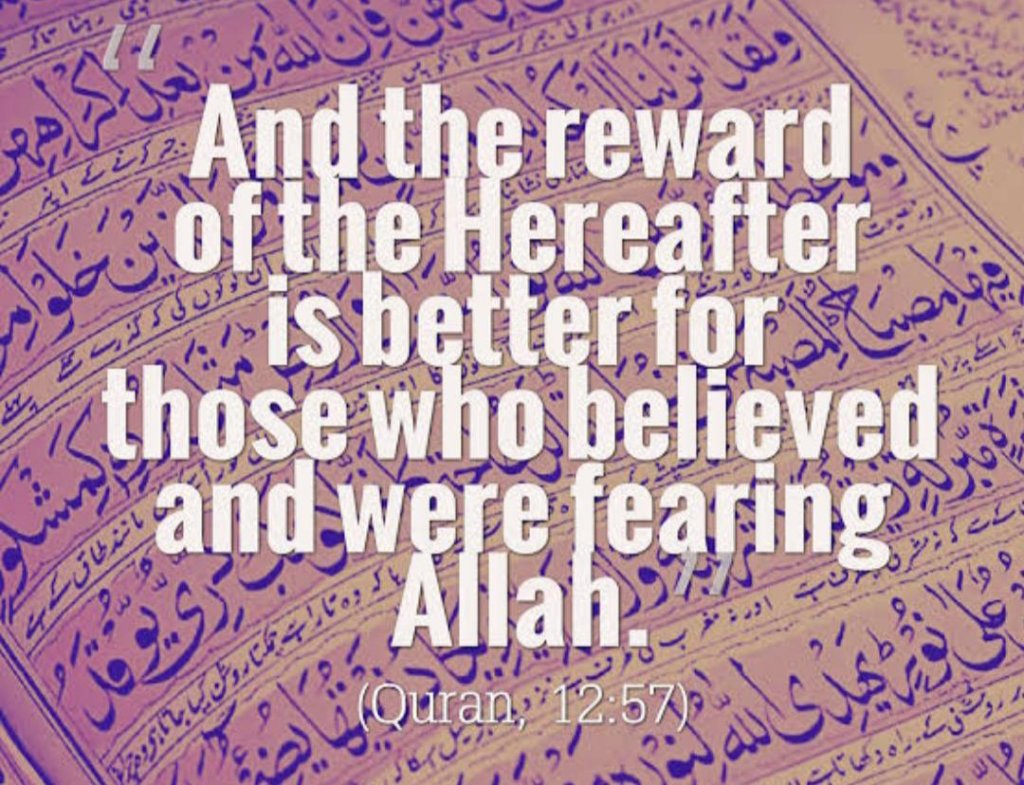
Surah Al-Inshiqaq is a Meccan surah with twenty-five verses. The Surah takes its name from the word inshaqqat in the first verse. Inshaqqat is infinitive which means to split asunder, thereby implying that it is the Surah in which mention has been made of the splitting asunder of the heavens.
This is one of the earliest Surahs to be revealed at Makkah. The internal evidence of its subject matter indicates that persecution of the Muslims had not yet started, however, the message of the Quran was being openly repudiated at Makkah and the people were refusing to acknowledge that Resurrection would ever take place when they would have to appear before their God to render an account of their deeds.
Its theme is the Resurrection and Hereafter.
Allah vividly states that how the heavens on the Final Day will split asunder, the earth will be spread out plain and smooth, and it will throw out whatever lies inside it of the dead bodies of men and evidences of their deeds so as to become completely empty from within. On that Day nothing will dare to disobey His Command. For them the only right and proper course is that they should obey the Command of their Lord.
Whether man is conscious of this fact or not, he in any case is moving willy nilly to the destination when he will appear and stand before his Lord. At that time all human beings will divide into two parts: first those whose records will be given in their right hands: they will be forgiven without any severe reckoning; second those whose records will be given them behind their back. They will wish that they should die somehow, but they will not die; instead they will be cast into Hell. They will meet with this fate because in the world they remained lost in the misunderstanding that they would never have to appear before God to render an account of their deeds, whereas their Lord was watching whatever they were doing, and there was no reason why they should escape the accountability for their deeds. Their moving gradually from the life of the world to the Hereafter was as certain as the appearance of twilight after sunset, the coming of the night after the day, the returning of men and animals to their respective abodes at night, and the growing of the crescent into full moon.
In conclusion, the disbelievers who repudiate the Quran instead of bowing down to God when they hear it, have been forewarned of a grievous punishment and the good news of limitless rewards has been given to the believers and the righteous.
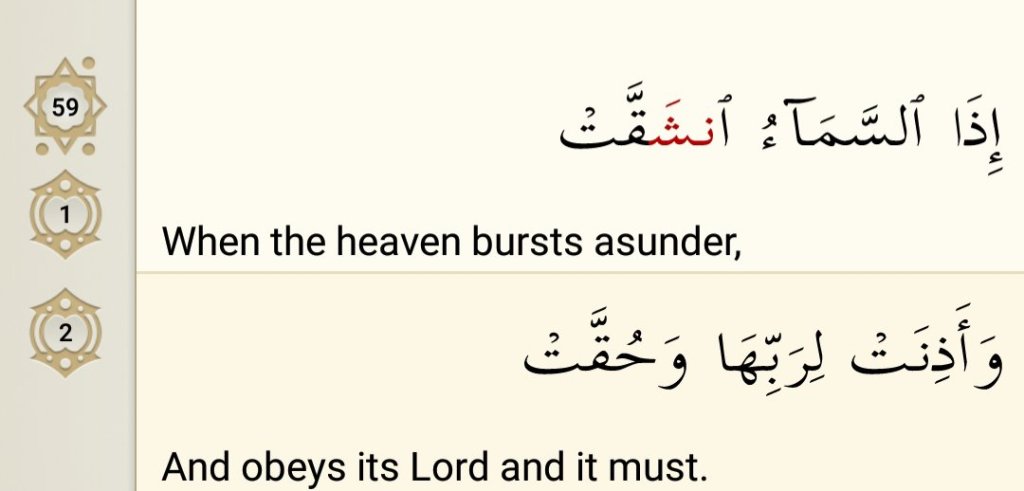
At the beginning of this Surah it talks about the awful and horrifying events which will happen at the end of this world. Allah says the Day when the heaven will burst assunder. Inshaqaaq means to be torn completely and in Arabic it is used when you tear something which you do not normally associate with tearing.
No one might suppose that the sky, which is great and seemingly vast and limitless, would have the least resistance against this divine order. It will that Day, like an obedient person, resigns to the Divine Order, perfectly.
Allah tells us here that the sky listens intently to it’s Lord and we would generally not associate the sky with listening as it is an inanimate object but Allah here is calling to attention the rebellious human and he is being told in a rhetorical manner that when the sky is told to cease to exist then it is as though it is waiting to listen to the commandment of its Lord. This was its destiny and what it was meant to do. It is a Haqq – a right of Allah that the sky obeys Him and this is because Allah, its Rabb, created it.
The sky and earth in their own way responded to Allah and they obeyed Him in their forming and creation. And they will obey Him when He tells them to cause destruction to themselves. We do not normally associate hearing to inanimate objects but throughout the Quran there is the idea that even inanimate objects glorify Allah and on the Day of Judgement they will speak. We are being told that the creation around is like us in the sense that it listens to the commands of Allah and obeys. When Allah complains of the disobedience of the human he compares us to the rest of the universe where everything in the heaven and earth declares Allah’s Perfection.
Whatsoever is in the heavens and whatsoever is on the earth glorifies Allah, the King (of everything), the Holy, the All-Mighty, the All-Wise.
(Surah Jumu’ah V:1)

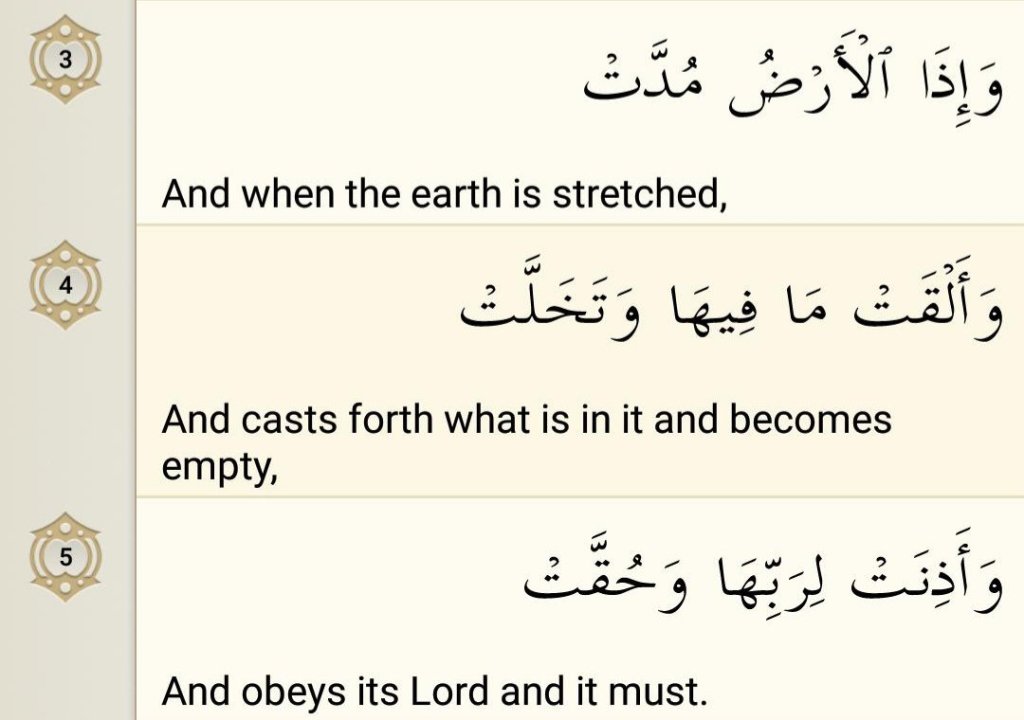
After mentioning the higher celestial creation of the heavens, now Allah mentions the lower creation of the earth. Madda is used in Arabic to stretch something across its length. The stretching of the earth is also described in the hadith that Allah’s Messenger pbuh said;
“ On the Resurrection Day the earth will be flattened out and spread out like the table-cloth; then there will hardly be room on it for men to place their feet.”
(Mustadrak al-Hakim)
And also same theme is described in Surah Ta-Ha,
“He will turn the earth into an empty level plain, wherein you will neither see any curve nor crease.”
(V: 106-107)
Then Allah continues with the theme of inanimate objects responding to the command of its Lord. Allah says the earth is going to to spit and throw things out that Day. Thus as the earth is stretched, everything that is within it will pop out and be thrown in front of people until there is nothing left. This is to strike fear into the heart of the listener and to remind him that there will be no place of safety that day and all the treasures and secrets of the earth that will be thrown out.
Just like with the sky earlier, Allah says that the earth listened intently and complied with the command of its Lord as if it was waiting for this moment and this was its destiny. The earth is eager to follow the instruction of its Lord and cannot wait to receive the instruction and so this is more than just an act of obedience. This is the zeal that the earth shows and it is only rightful for it to do so.
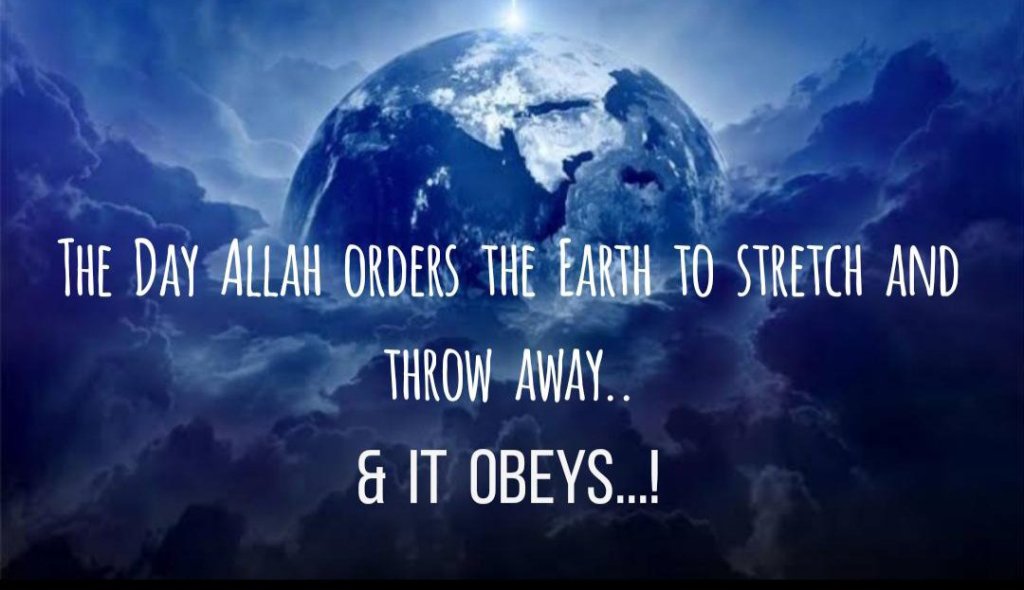
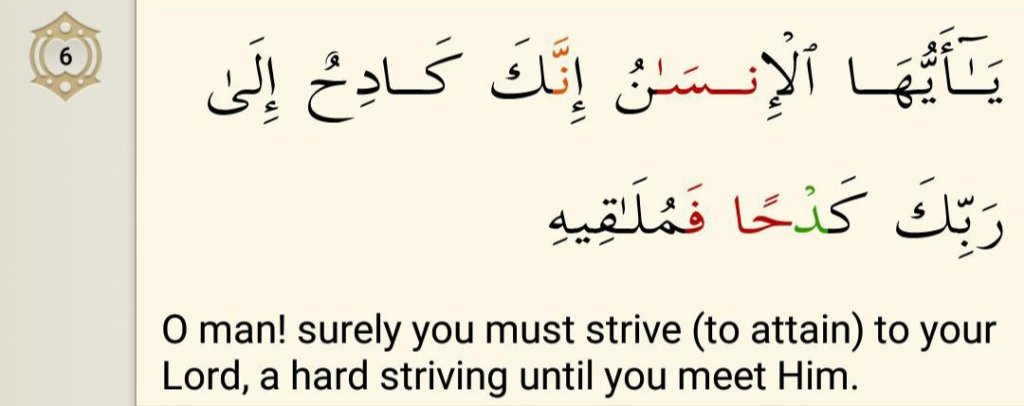
Then Allah says O man! Verily, you have been toiling towards your Lord with your deeds and actions (good or bad), a sure returning, and you will meet Him with the results of your deeds which you did!
This verse is the central message of this Surah. One of the origins of the word insaan is nasiya which means to forget so one of the meanings of this beginning is ‘Oh forgetful human being’ – you’ve forgotten where you came from and your destiny and this addresses humanity not just Muslims. The earth and the sky did not forget, but man did!
Man is actively engaged in toiling labour. Part of this life is to struggle for things and certain milestones and for every milestone we work hard. Kadh has been described as a struggle towards something, without any distinction as to whether it’s good or bad – you’re just engaged in striving for it and immersed in it to the extent that it exhausts you. Allah says that with all these milestones you can sometimes forget where you’re heading. You’re actually on a motorway and these milestones are just small steps. Where will you end up? You will end up with your lord. Whatever you are engaged in, whether it’s good or bad, you are headed to your lord.
Man in this verse is in sense of all human beings, and stressing on the humanity, is addressed by the verse, and this tells us the fact that Allah has created the required faculties in man to pave the way from the beginning to the end. This troublesome effort of life is a part of the Divine program towards man’s development.
Verily, we are travellers, from nothing, who have entered the realm of existence and are going to the Abode of Love with the hope that we shall meet Him.
Thus we may think that all our efforts and endeavors in the world are confined to worldly life and motivated by worldly desires, yet the truth is that we are moving, consciously or unconsciously, towards our Lord and we have ultimately to appear before Him in any case.

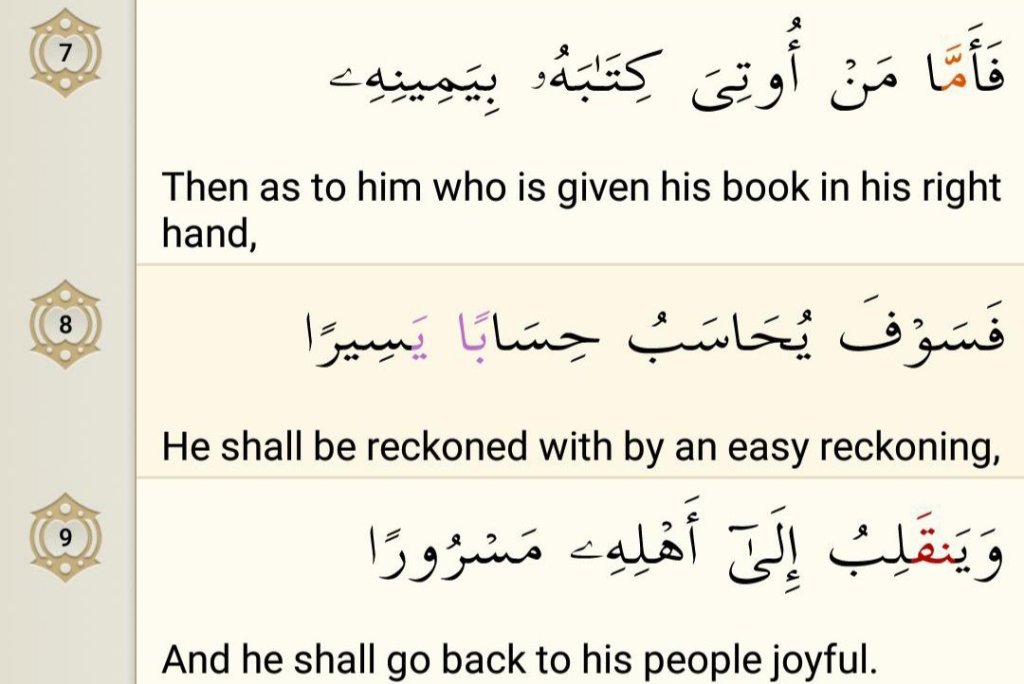
This group of people are those who act and use their lives in the same way that Allah has guided man to do. All their efforts and endeavours are for the sake of Allah and their entire movements are always unto Allah. There, they are given their Records in their right hand and that shows the purity of their deeds, the correctness of their faith, and their deliverance in the Hereafter that will bring them joy and happiness; an honour to all human beings gathered there.
When they stand in front of the Scale (for reckoning), that which is very just, Allah reckons with them easily. He forgives them of their faults and, because of their strong faith and good acts, changes their sins into good deeds.
His reckoning will be less severe, he will not be asked why he had done such and such a thing and what excuses he had to offer for it. Though his evil deeds also will be there along with his good deeds in his records, his errors will be overlooked and pardoned in view of his outweighing good deeds.
He knows that Allah by placing the book in his right hand, which also signifies honour, has made an agreement and given him honour and the promise of paradise at which point all the nervousness in him has gone, as he knows where he is headed.
So as for he who is given his record in his right hand, he will say,
“Here, read my record! Indeed, I was certain that I would be meeting my account.” So he will be in a pleasant life – In an elevated garden.”
(Surah Al-Haaqah V:19-22)
Our love for our family on that day will be associated with those who believed with us in this world. The shahada itself can be considered to make us part of a bigger and more significant family just as the bond between believers in this world. Real happiness is when the family comes together through obedience to Allah. This means the family and relatives and companions who will have been pardoned even like himself. Imagine in this dunia when we gain any victory, out first urge and desire is to go and tell the good news to our beloved ones like family and close friends. Then the success of Akhirah is far greater, book of deeds in right hand means will be worth mentioning to the beloved ones!
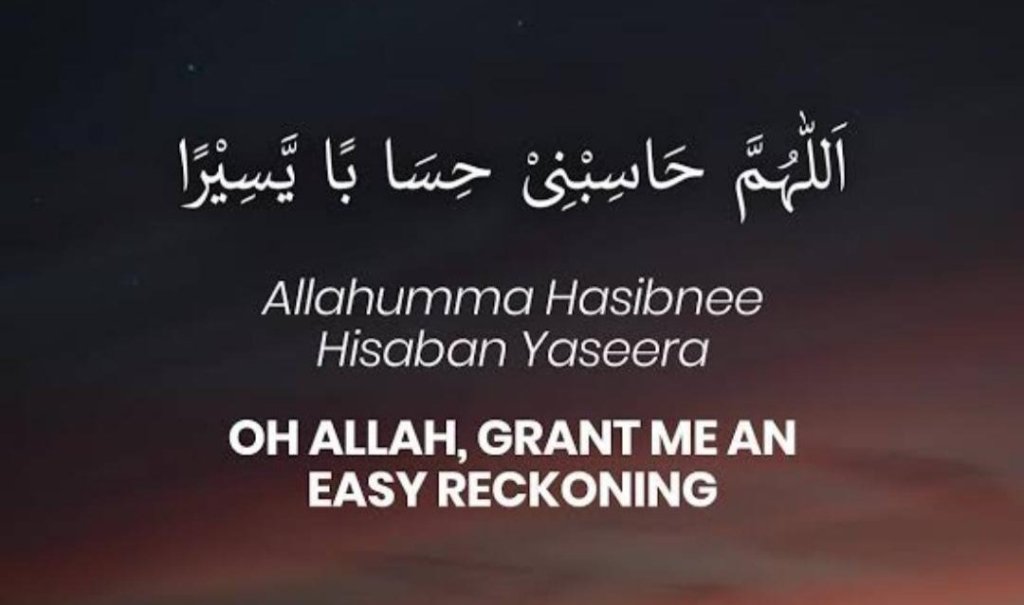
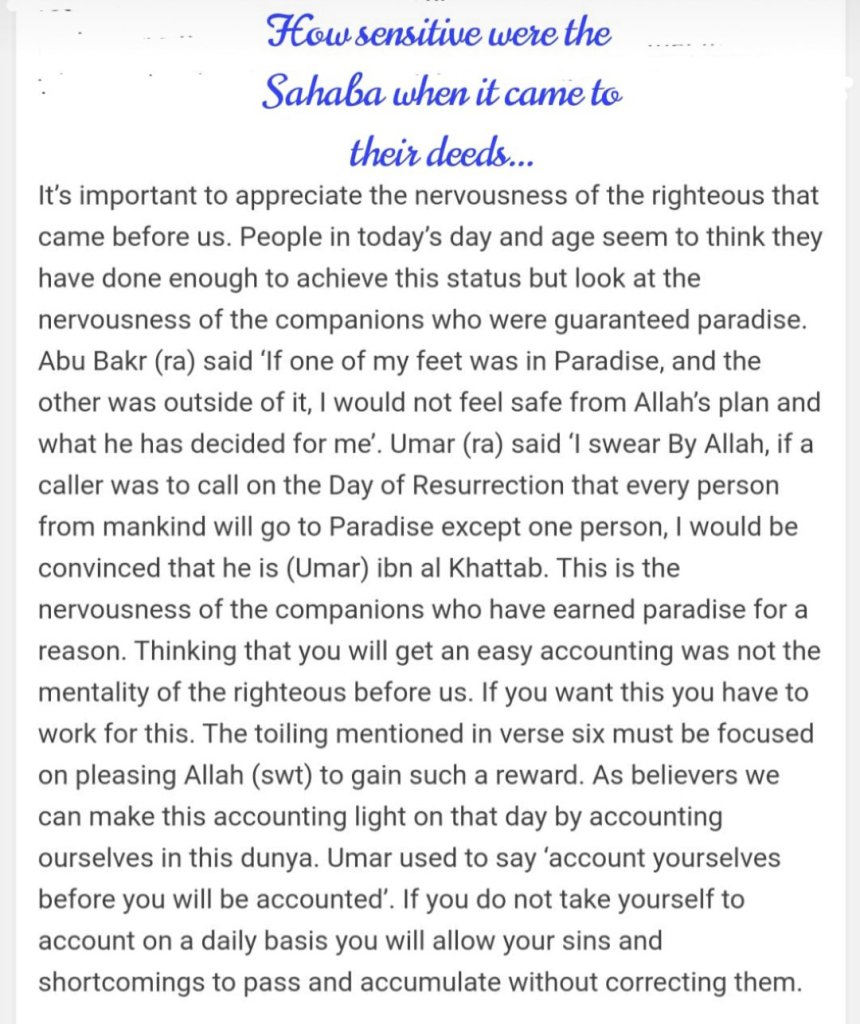

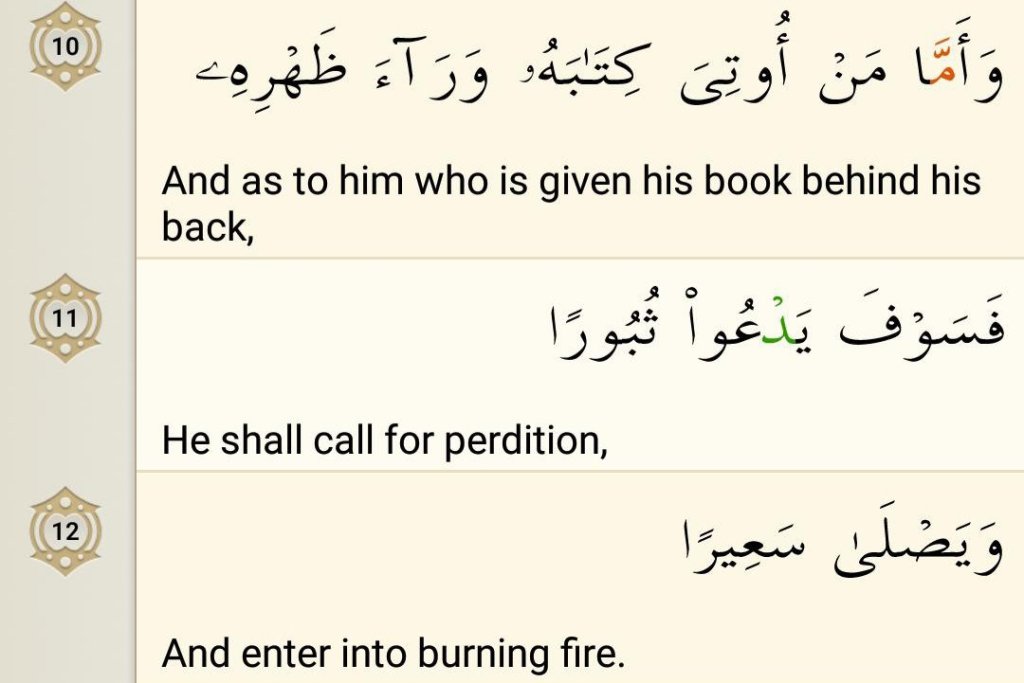
Those Who Hold Their Record Behind Their Back!
In contrast to the previous verses, which were about those who are given their Record in their right hand, these verses are about the disbelievers and how they are given their Records.
It is more agreeable to say that the doers of good take their Record happily in their right hand and call, with pride and boasting to others in the Hereafter: “Ah here! Read ye my Record!”
But, when the wicked are given their Record in their left hand, they will keep it behind their back shamefully in order for it not to be seen by others, but unfortunately it is of no use, because nothing is hidden there. This will probably be for the reason that he would already have lost all hope that he would be given his record in his right hand, for he would be well aware of his misdeeds and sure to receive his record in his left hand. However, in order to avoid the humiliation of receiving it in the left hand, in front of all mankind, he will withdraw his hand behind and so would receive it ‘behind his back.
They cry for perdition, but it will be in vain and they will receive the command: “And enter in Blazing Fire”, that is, they will arrive at the blazing fire of Hell, as their final punishment!
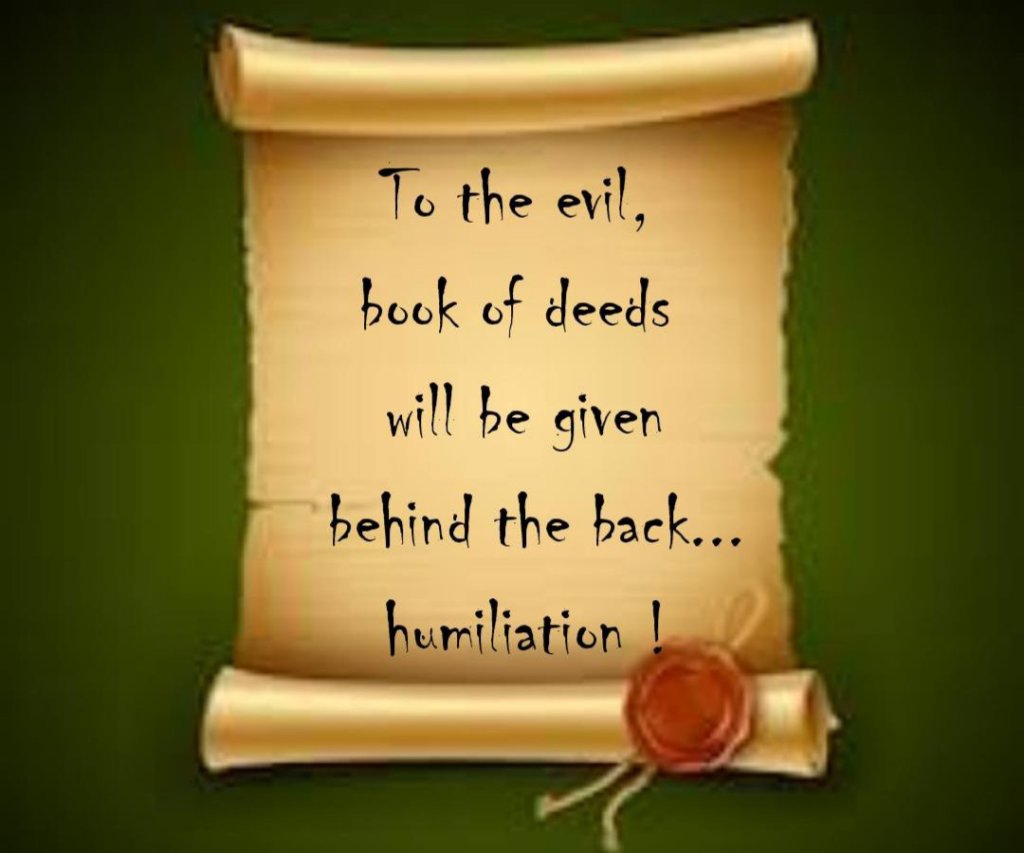
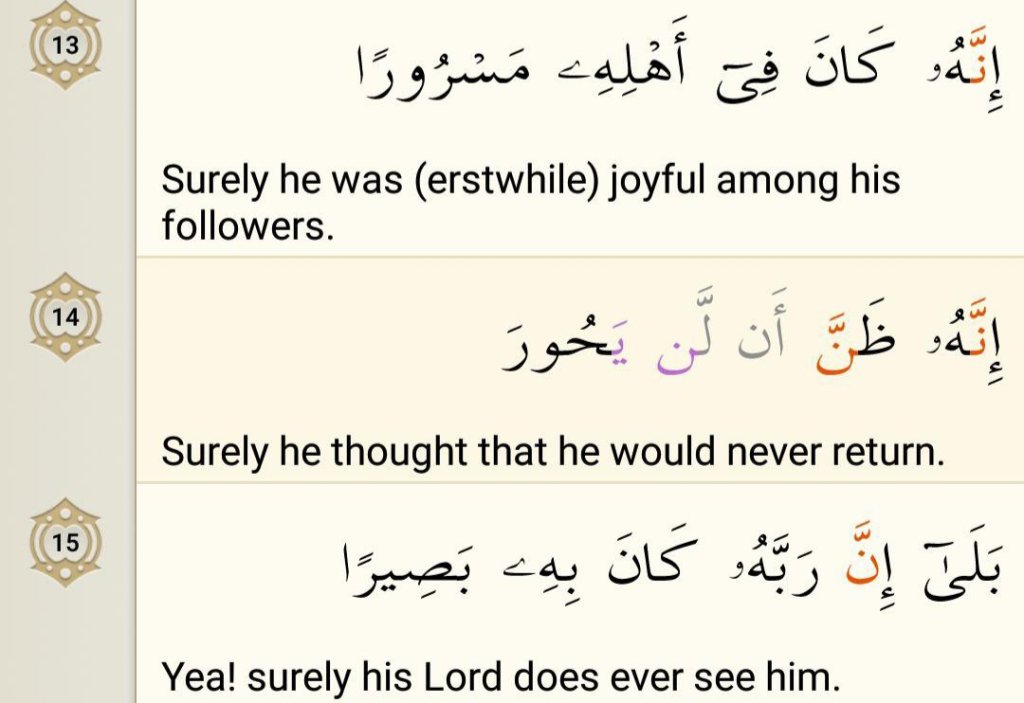
Now Allah continues the subject that what made the destiny of such people into Hell. This man lived a life free from every care and worry and helped his children and kinsfolk also to enjoy life fully, no matter what wicked and immoral methods he had to use to procure the means of enjoyment, how he had to violate the rights of others and the limits set by Allah for the sake of the worldly pleasures. It was a joy of pride, and the pride originated from neglect and being forgetful of Allah. His self-love and self-conceit in this lower life of dunia, will now give way to regret and misery in Akhirah.
It is clear that joy or happiness is not naturally blamed or forbidden, but a believer should be hopeful and happy of Allah’s Grace, and be always rejoicing and good tempered with others when interacting with them. That joy is blameworthy which makes people forgetful of Allah, and entangles them only in their lusts.
The disbeliever however has not concerned himself with the next life. Ibn Katheer comments that this is the person who used to be happy with his family and never thought deeply about the consequences of his actions and never feared what was in front of him thus Allah replaced his careless joy with lasting grief.
The happiness of the disbeliever through his enjoyment of the luxuries of this dunia, such as being carefree to the responsibilities of worship such as prayer and fasting led to his destruction in the Hereafter. Often this is what prevents people from practicing Islam as all they see is struggle when all they want to do is enjoy themselves. However, this is not true happiness. True happiness is achieved through nourishing one’s soul. The happiness of the soul is eternal and the happiness of satisfying one’s desire is temporal and causes pain afterwards.
In fact, the true source of his misery and corrupted idea was his denial of the Resurrection, that which made him proud and heedless and thus, he became deluded of Reality. This verse shows that the lack of belief in the Resurrection is the origin of carelessness, pride, and corruption.
But Allah is ever watchful over man and He has recorded all of man’s acts, and kept all the data for the coming Reckoning Day. Allah’s watchfulness over man’s actions and the record of the deeds are not done in vain. They are certainly primary to the final Judgment and, consequently to the reward and the punishment.


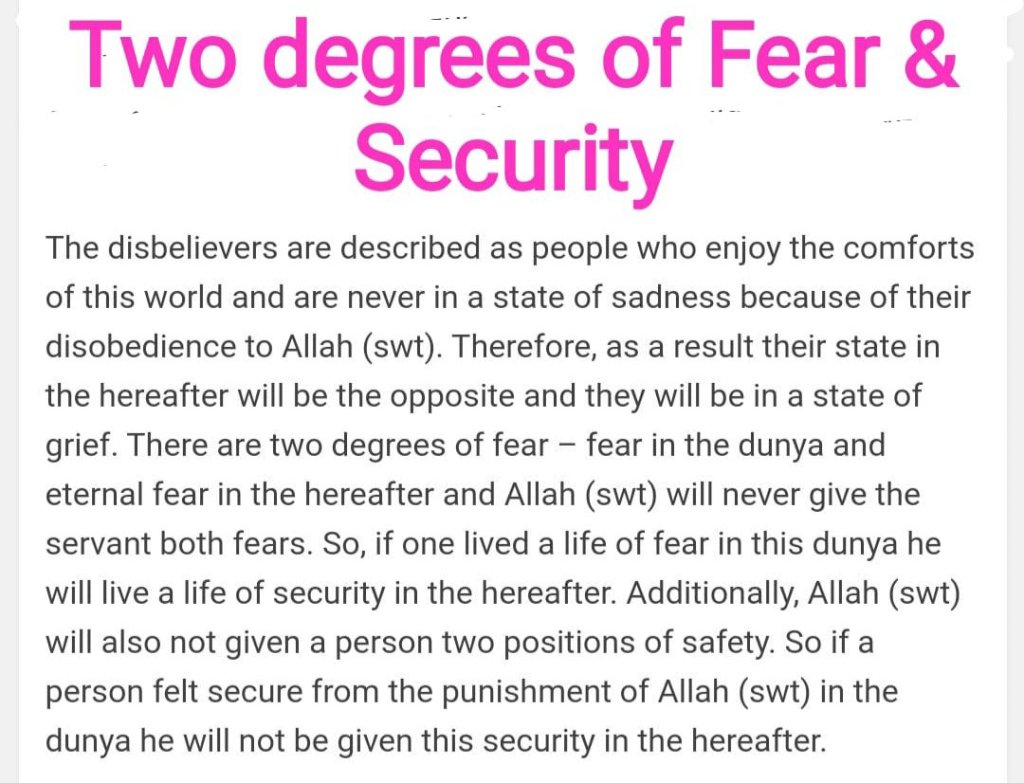
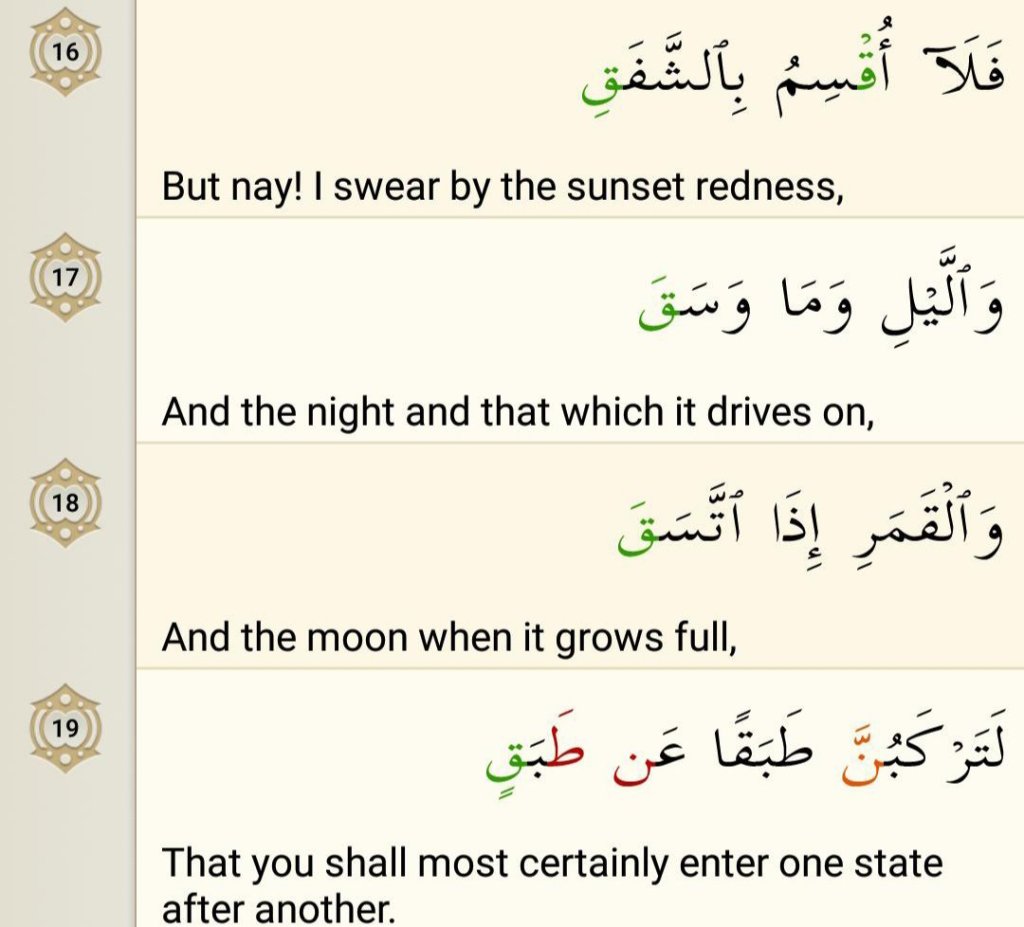
Now Allah takes oaths in three things to confine the reality that man is gradually moving from one state after another to his final destiny. The oaths are,
(1) by the twilight
(2) by the darkness of night and whatever it gathers in its darkness
(3) by the moon’s passing through different phases to become full.
1) By the twilight…
Shafaqq is when the sky starts turning red at maghrib time and is an indication of the gradual change from daylight into night. The redness that appears as the evening draws close is also metaphorically an indication of the end of life and the dunia as we know that darkness is coming next.
2) By the darkness of night and whatever it gathers in its darkness…
The word wasaq is that which gathers and envelops everything inside of it. This is a progression from the previous verse as when the redness of sunset appears, the night is on its way and it is unavoidable and will envelop everything. Furthermore, just like the day comes to an end so to will life. Death shall envelop and come to every human being and none can escape it. This should strike fear into the hearts of people especially the disbelievers.
3) by the moon’s passing through different phases to become full…
The word tasaqq means to become full and complete and Allah is swearing by the moon when it is at its fullest and giving the most light. This verse also continues the theme of gradual inevitability as the moon also goes through phases until it becomes full. This is Allah letting us know that the clock is ticking and that time is passing by. Just like the previous verses describe how man is inevitably heading towards his Lord, these verses describes the sky inevitably becoming darker and red, turning into the night and the moon inevitably becoming full.
There is also a sign of hope for the believers with this verse despite the darkness. When the moon comes and gives light it is a sign of hope and this is a common Quranic style of striking fear in the heart of the disbelievers and of giving hope to the believers.
The subject of oaths takes is that O man! You will not remain in one and the same state, but will have to pass through countless stages gradually, from youth to old age, from old age to death, from death to barzakh (the intermediary state between death and Resurrection), from barzakh to Resurrection, from Resurrection to the Plain of Assembly, then to the Reckoning, and then to the meeting out of rewards and punishments. There is a continuous and gradual change taking place everywhere. Therefore, the disbelievers are wrong in thinking that life comes to an end after man has breathed his last.
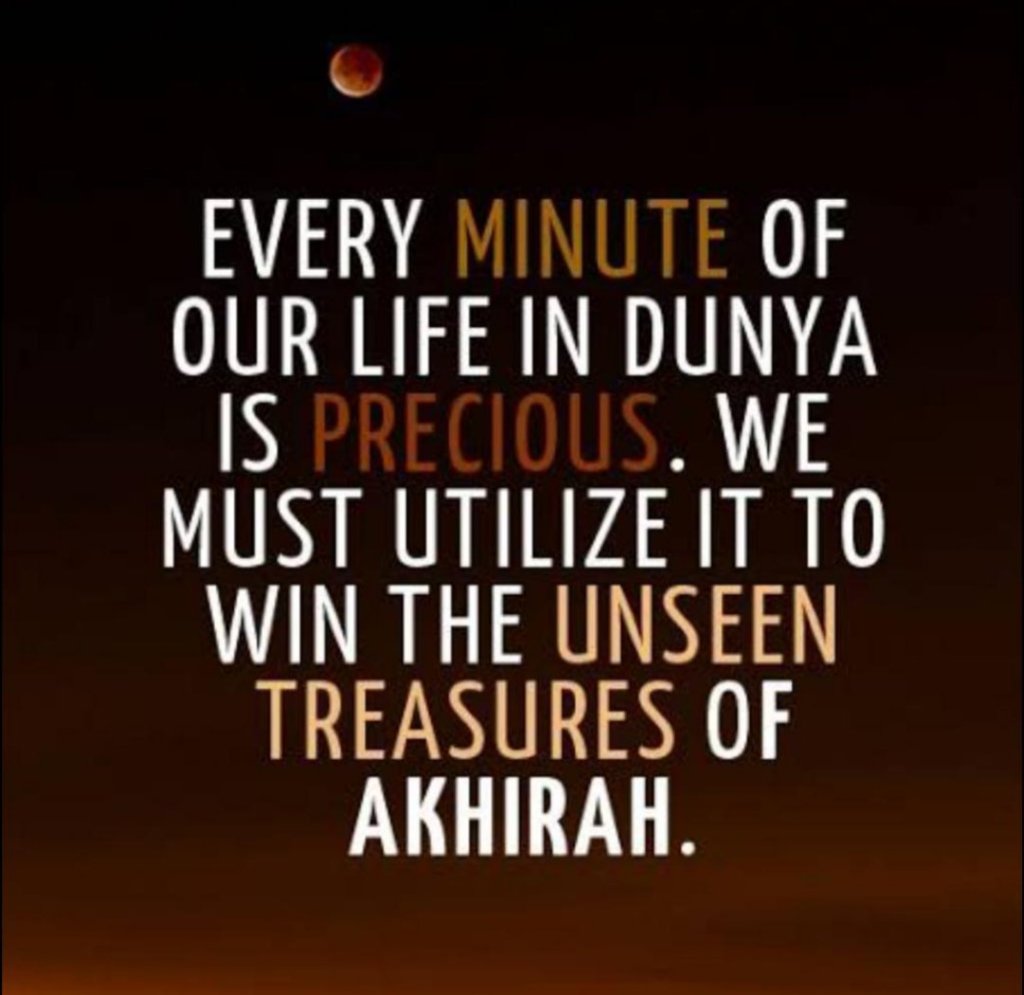
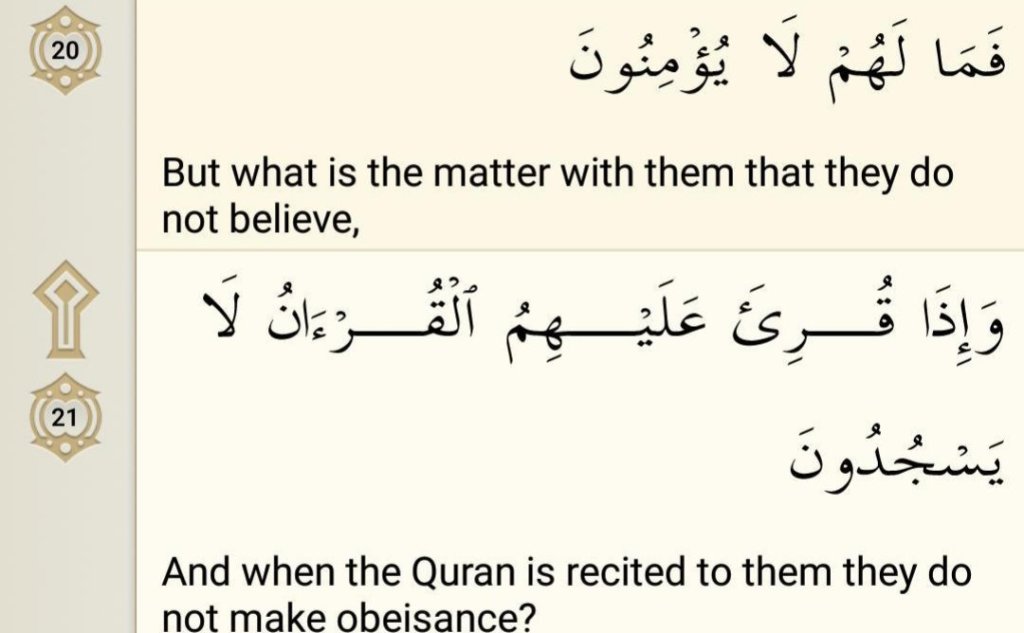
These are the concluding verses and now Allah asks a rhetorical question the purpose of which is condemnation and wonder. Here, Allah is asking what is wrong with man that he does not believe? The sky obeys, the earth obeys, so why does man not believe and obey? How can they ignore the immense blessings they have from Allah? They have clear evidences and signs for Resurrection, both in outer nature like day and night, sun and moon, light and darkness, sunrise and sunset; and inner nature like man’s own creation; to other stages one after another until death, but they do not believe. Why do they not accept of Allah’s grace instead of disputing about it?
Then Allah says that when Quran is recited to them, they do not prostrate. The Quran is so bright and clear that it is a good evidence for itself and that its content is from the Divine source. Allah is calling onto them and asking what is wrong with them that they do not fall into sajdah when they hear the Quran, meaning they know it is so powerful and that they have not heard anything like it before yet still they do not give in and fall into sajdah, rather they hold themselves back. They do not fall prostrate means that they do not bow down to God out of fear of Him. To perform prostration here is confirmed by the practice of the Prophet pbuh.
Another meaning of this is humility. The word sujood from a linguistic perspective has a meaning of humbling or lowering oneself. This is why we find in the Quran that Allah uses sujood in this way to refer to a general humbling and lowering of oneself before Him. Sujood here means one should submit himself to the command of Allah.
Listening to the Quran should lead to one humbling himself before Allah. This is what we should try to achieve when listening to the Quran and what our intention should be. We should not listen to recitations of the Quran with empty minds. We should listen to it with the intention of it affecting us in a positive way. So, the interpretation of this verse is that they do not humble themselves when they hear the Quran.
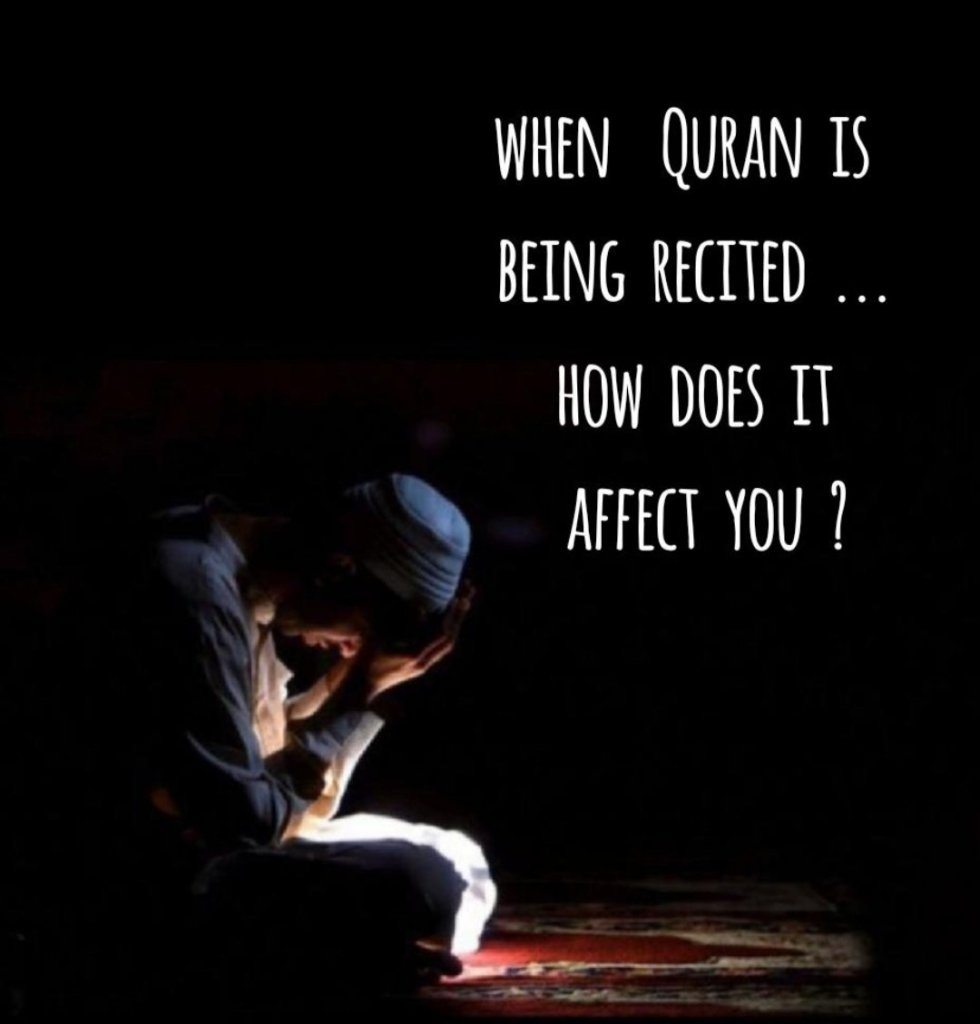
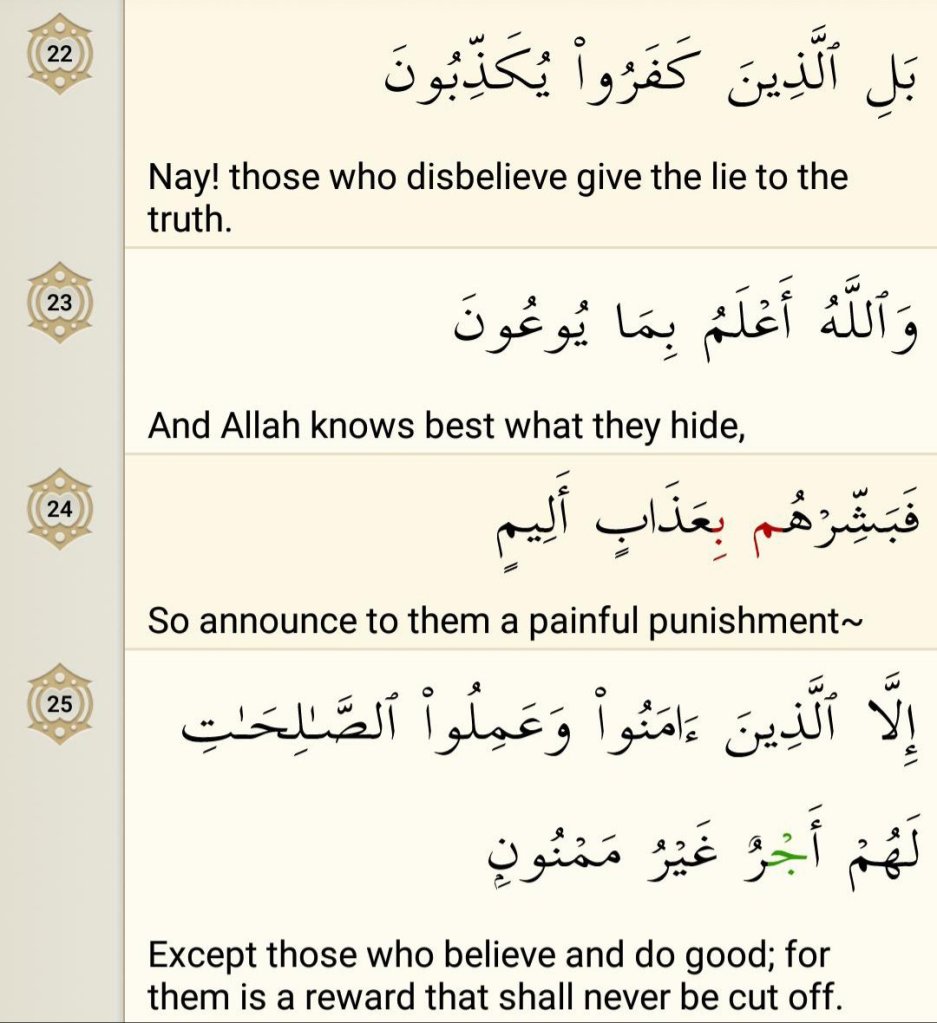
Now Allah says that these people continue to disbelieve despite all that is made clear. Such people are lying viciously against the Allah, the Messenger pbuh and the verses of the Quran that they know to be the truth. This is a type of amazement at how they could continue to disbelieve after all this. A rhetorical question was asked earlier that what is wrong with them that they do not believe. Here this is a response meaning that there is no valid reason for them to disbelieve. It is their inner that is blind and they follow the continuous psyche of rejecting the Truth.
Then Allah says that He knows best what they gather (of good and bad deeds). Allah is more aware of what they keep hidden inside implying that they openly manifest their disbelief but inside they know what the truth is. Allah is aware of their thoughts and aims, and, also, of the motives causing those constant rejections. Then, whatever more they keep secret, finally He will punish them.
Then Allah says to give them good news of a painful punishment. The word bashara is usually translated as giving glad tidings to someone. This is a type of ironic mockery where the disbeliever is given glad tidings of punishment in the Hereafter. This verse instructs to give them good news of and congratulate them on a painful punishment. This is a warning to these criminals that if nothing has caused them to change after all these points for reflection have been given then punishment is the only suitable reward for them and the only thing left to give them is a sarcastic comment about the Hereafter just like they have been sarcastic.
However for those who believe and do righteous deeds, for them is a reward that will never end. One of the purposes of this is to give hope to the believers. To let them know that if they have done good in the past and have believed then their reward will be safe and will be guaranteed. This verse also indicates that belief alone is not sufficient. It has to be coupled with good deeds and if you truly believe in something you have to back it up with your actions.
The rough translation of ghayru mamnoon is that they will have an uninterrupted reward (ajr). In Arabic mann means to cut something and mamnoon means that which is cut, thus, ghayru mamnoon means that which will not be cut. Thus, ghayru mamnoon is a reward which they will not be separated from, an eternal bliss for the believers!
